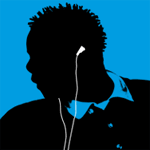« Home | CBS Radio Schizophrenia in New York City: Now Brea... »
This Memorial Day weekend, radios are blaring but not from the usual sources
 It's Memorial Day long weekend...the traditional informal start to summer. When beaches open, shorts and bikinis get worn for the first time of the year, and BBQ grills are ready for use. It used to be this was the weekend you'd really start hearing what total strangers where listening to. Not too long ago, when you weren't cranking out your favorite radio station's tunes while cruising with the windows down, you'd see people with their boom boxes blaring in parks, walking down the sidewalk, in the neighbor's backyard or at the beach.
It's Memorial Day long weekend...the traditional informal start to summer. When beaches open, shorts and bikinis get worn for the first time of the year, and BBQ grills are ready for use. It used to be this was the weekend you'd really start hearing what total strangers where listening to. Not too long ago, when you weren't cranking out your favorite radio station's tunes while cruising with the windows down, you'd see people with their boom boxes blaring in parks, walking down the sidewalk, in the neighbor's backyard or at the beach. It guess we are more polite now...everyone's got their iPod earbuds instead.
It guess we are more polite now...everyone's got their iPod earbuds instead.
Despite what you most often read about radio lately (you know, commercial radio sucks, too corporate, too stale, run by suits instead of creative people, lower amounts people spent listening to commercial year after year, yadda yadda), "radio" usage is actually hotter than ever...if you expand the definition of radio beyond the traditional local commercial radio station you listen to getting ready in the morning, driving with you to work and back or even listening to when you're putzing around doing house chores. "Radio" is everywhere now -- satellites, online (thousands of online stations, RealAudio, AOL, Yahoo Launch, MSN, etc.), on your cellphones, on iPods, music libraries on your computer so you can hear the playlists you want to hear whenever you want...without the commercials. Albeit slowly, even traditional commercial radio is trying to catch up by streaming their broadcasts online and -- after more than 10 years of reluctance to enter the digital broadcast age -- by getting behind HD Radio. By the end of the year, more than 1000 "secret" sister channels will be broadcasting in "high def digital" adjacent to their big brother regular radio stations. All you need is a special radio receiver that can pick up the stations. At a cost of $300 to $500, mind you.
"Radio" is everywhere now -- satellites, online (thousands of online stations, RealAudio, AOL, Yahoo Launch, MSN, etc.), on your cellphones, on iPods, music libraries on your computer so you can hear the playlists you want to hear whenever you want...without the commercials. Albeit slowly, even traditional commercial radio is trying to catch up by streaming their broadcasts online and -- after more than 10 years of reluctance to enter the digital broadcast age -- by getting behind HD Radio. By the end of the year, more than 1000 "secret" sister channels will be broadcasting in "high def digital" adjacent to their big brother regular radio stations. All you need is a special radio receiver that can pick up the stations. At a cost of $300 to $500, mind you.
Really, there are two camps watching the trend of radio usage and viability. Either radio is dying an ever quickening death...or radio is at its most exciting time ever.  I'm actually in the second camp, being a radio fan. That's for radio as a whole concept. Things like satellite radio, Motorola's iRadio unit, the free streaming of internet radio stations, the iPod...all this new media updating of radio.
I'm actually in the second camp, being a radio fan. That's for radio as a whole concept. Things like satellite radio, Motorola's iRadio unit, the free streaming of internet radio stations, the iPod...all this new media updating of radio.
There is a tremendous amount of energy and investment pouring into doing radio in a different way than traditional commercial radio. Any form of radio thinking and doing for the future makes you immediately want to turn it on and turn up.
For most of radio's history, it's power was purely local-based. Government ownership rules prevented any one company from owning too many stations. This limited its influence as well as its power, helping reduce the potential of corruption.  As the famous Lord Acton quote goes, "Power corrupts, and absolute power corrupts absolutely." Well, radio felt it needed more power in order to better compete against larger media revenue threats; that the rules keeping their companies and its industry "smaller" were unfair. So it got what it wanted. Regulations were dropped, radio rapidly "grew" through massive consolidation, and radio station owners got the power they wanted. But, instead of using that new power to truly invest in real growth and to make the transformation required to thrive in the digital age, it wrongly focused on being a better "sell" against other old medias like newspapers and TV.
As the famous Lord Acton quote goes, "Power corrupts, and absolute power corrupts absolutely." Well, radio felt it needed more power in order to better compete against larger media revenue threats; that the rules keeping their companies and its industry "smaller" were unfair. So it got what it wanted. Regulations were dropped, radio rapidly "grew" through massive consolidation, and radio station owners got the power they wanted. But, instead of using that new power to truly invest in real growth and to make the transformation required to thrive in the digital age, it wrongly focused on being a better "sell" against other old medias like newspapers and TV.
The consolidation of commercial radio created this massive new bureaucratic mess radio (and any industry) had ever managed before. There was no model. There was no example. There were no clearcut controls. Only the rules of whom actually possessed the power and however they decided to use that power. At best, the results are mixed, if I were to remain polite as an observer. If I were being honest and real, this new consolidation power did indeed corrupt...and the huge sucking sound heard across America was coming out from everyone's radio speakers. A quality vacuum had been created. Fortunately, the passion of people that still loved creating great radio continued...and moved on to loads of new digital tools transmitting to the micro masses. In total (combining all versions of traditional commercial radio with new digital versions), Americans are listening to more "radio" than ever before. 94% of Americans still listen to commercial radio at least once a week. More than 50 million iPods have been sold. XM and Sirius satellite radio have more than 11 million subscribers. There are more than 1 BILLION that have internet access around the world now and it is estimated that 16% listen to some version of radio streamed on the Net at least once a week...that's another 160 million times "radio" has been listened to.
In total (combining all versions of traditional commercial radio with new digital versions), Americans are listening to more "radio" than ever before. 94% of Americans still listen to commercial radio at least once a week. More than 50 million iPods have been sold. XM and Sirius satellite radio have more than 11 million subscribers. There are more than 1 BILLION that have internet access around the world now and it is estimated that 16% listen to some version of radio streamed on the Net at least once a week...that's another 160 million times "radio" has been listened to.
All the excitement in radio comes from innovative visionaries whom embraced the digital age and how to make radio better. Too bad the newly-acquired "power" commercial radio obtained (re: bought) just 10 years ago corrupted too many of them to truly see the need for innovation. Is commercial radio too late to the party to survive this evolutionary change? As a media trend watcher, the radio industry is sure late in the game and are doing much too little. Some "second tier" companies are thinking big where innovation is more important than company size. Maybe they can be a guiding light.
The end result of power corrupting always end poorly when the corruption isn't fixed from within. That's the beauty of the capitalistic system. The fittest survive. The obsolete get tossed aside and forgotten. Radio listeners are already making their decisions. I wonder what their choice will be in a few years from now?
Radio listeners are already making their decisions. I wonder what their choice will be in a few years from now?
Meanwhile, whether you are turning burgers on the BBQ, driving with the top down, jogging alongside the beach or through the park, turn up those radios this Memorial Day...on whatever device you're listening to it on.
Last month, Red Herring published an excellent article on how radio's late efforts entering the competitive digital media world are not grabbing listeners yet. Among the quotes:"The industry has begun testing new electronic ratings technologies, but the four-decade-old diary ratings system is keeping the industry, which depends almost entirely on advertising, at a significant disadvantage in competing with instant-feedback media such as the Internet. The industry, which initially steered clear of the Internet and viewed it as a dangerous competitor, has embraced digital technologies such as podcasting, High Definition Radio, the Internet, and improved listener-counting methods—significant steps for the conservative industry. But the new technologies have failed to arrest the exodus of younger listeners who choose MP3 downloads, satellite radio, Internet radio, and other alternative entertainment options over terrestrial radio...
Read the entire article here at Red Herring.
posted by Unknown @ Saturday, May 27, 2006,
![]()
![]()















